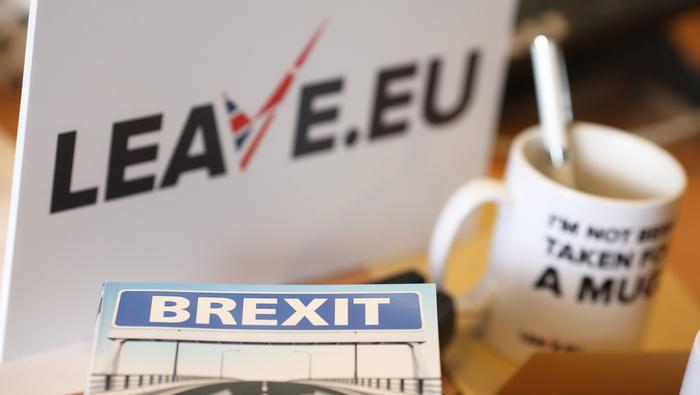British Pound, GBP/USD, Brexit, US-UK Trade Deal, Internal Market Bill – Talking Points:
- Equity markets surged higher during APAC trade as abating election uncertainty firmed market sentiment.
- Brexit talks will likely dictate the outlook for the politically-sensitive British Pound.
- Internal Market Bill could threaten US-UK trade relations.
- GBP/USD struggling at key resistance. Is a reversal lower in the offing?
Asia-Pacific Recap
Equity markets kicked-off the new trading week on the front foot, with Asian markets cheering the outcome of the US presidential election and the more diplomatic approach to foreign policy expected under a Biden administration.
Japan’s Nikkei 225 index soared 2.45%, Hong Kong’s Hang Seng rose 1.77% and Australia’s ASX 200 climbed 1.75%, as market sentiment notably firmed on the back of abating election uncertainty.
The haven-associated US Dollar continued it slide to fresh monthly lows, while the Japanese Yen slipped lower against its major counterparts.
The cyclically-sensitive AUD/USD continued its impressive monthly surge, jumping 0.54% to test key resistance at the 0.7300 mark.
Gold and silver continued to push higher as yields on US 10-year Treasuries held steady at 82 basis points.
Looking ahead, speeches from Federal Reserve Presidents Patrick Harker and Loretta Mester headline the economic docket alongside Mexican inflation data for October and a speech from European Central Bank President Christine Lagarde.
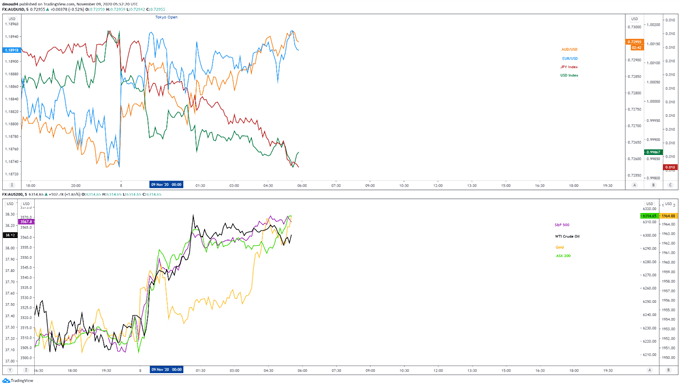
Market reaction chart created using TradingView
Looming Brexit Deadline to Weigh on GBP
The politically-sensitive British Pound may come under pressure in the coming days, as negotiators from the UK and EU scramble to deliver a Free Trade Agreement (FTA) before the proposed Brexit deadline on November 15.
Prime Minister Boris Johnson believes a deal is “there to be done [and] the broad outlines are pretty clear”, adding that “I’ve always been a great enthusiast for a trade deal with our European friends and partners”.
However, European Commission President Ursula von der Leyen doesn’t seem to share Mr Johnson’s optimistic outlook, stating that although “some progress has been made, large differences remain especially on level playing field and fisheries”.
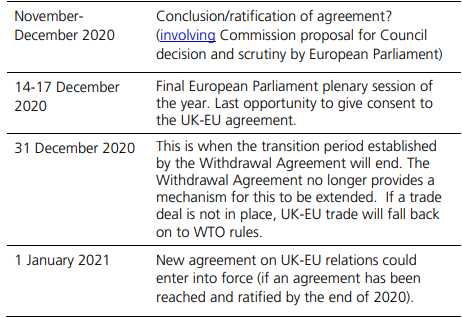
Source – UK House of Commons
These issues have been a consistent stumbling block for negotiations and it seems relatively unlikely that either side will compromise, given EU chief negotiator Michel Barnier’s warnings that “the UK’s refusal to commit to conditions of open and fair competition and to a balanced agreement on fisheries, makes a trade agreement at this point unlikely”.
With that in mind, the prospect of the UK tumbling out of Europe without a ratified trade agreement could weigh on regional market sentiment and in turn undermine the British Pound against its major counterparts.
US-UK Trade Relations Hinge on Good Friday Agreement
Joe Biden’s stark warning to the British Prime Minister could also hamper the performance of the local currency in the medium-term, as the President-elect warned “we can’t allow the Good Friday Agreement that brought peace to Northern Ireland to become a casualty of Brexit [and] any trade deal between the US and UK must be contingent upon respect for the Agreement and preventing the return of a hard border”.
This prompted Foreign Secretary Dominic Raab to reassure Biden and his new administration that the government has “no intention of imperilling” Ireland’s peace process.

However, Johnson is still set to push forward with the highly controversial Internal Market bill, which will allow the Prime Minister to rewrite parts of the Brexit deal agreed upon with the EU in 2019 and calls into question the future of the Good Friday Agreement.
With that in mind, GBP/USD rates could continue to head lower if Johnson is successful in passing the legislation that allows the government to break the law in a “specific and limited way”, with the imposition of a hard border in Ireland threatening the future of a US-UK trade deal when President-elect Biden is sworn in on January 20.
GBP/USD Daily Chart – Buyers Struggling at March High
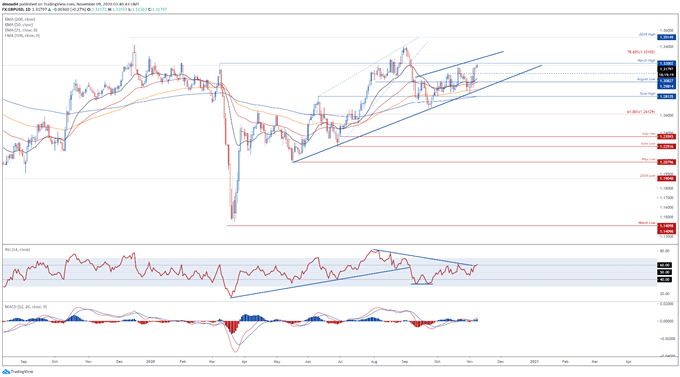
GBP/USD daily chart created using TradingView
From a technical perspective, the outlook for GBP/USD remains skewed to the topside as price continues to track firmly above all four moving averages and the RSI snaps its downtrend extending from the August extremes.
However, a reversal back towards the October 12 high (1.3083) could be in the offing if resistance at the March high (1.3200) holds firm.
That being said, with the MACD indicator pushing to its highest levels since early September and the RSI eyeing overbought territory, the path of least resistance seems higher.
To that end, a daily close below the March high (1.3200) would probably generate a test of the 78.6% Fibonacci (1.3310), with a break above needed to carve a path to test the yearly high (1.3483).
GBP/USD 4-Hour Chart – Bearish RSI Divergence Hints at Reversal
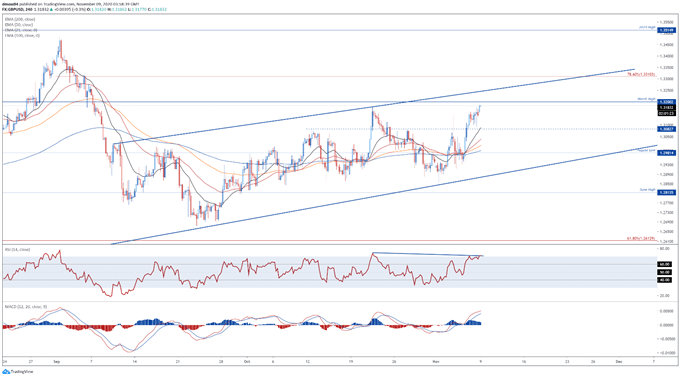
GBP/USD 4-hour chart created using TradingView
Zooming into a 4-hour chart suggests that GBP/USD may reverse lower in the near term, as the RSI fails to follow price to higher highs and the slope of the MACD indicator notably plateaus.
Failure to break above resistance at the March high (1.3200) could inspire would-be sellers and generate a push back towards the 21-MA (1.3089), with a break below probably bringing key support at the August low (1.2981) into focus.
Conversely, a breach of the psychologically imposing 1.3200 mark could open the door for GBP/USD to test resistance at the 78.6% Fibonacci (1.3310).
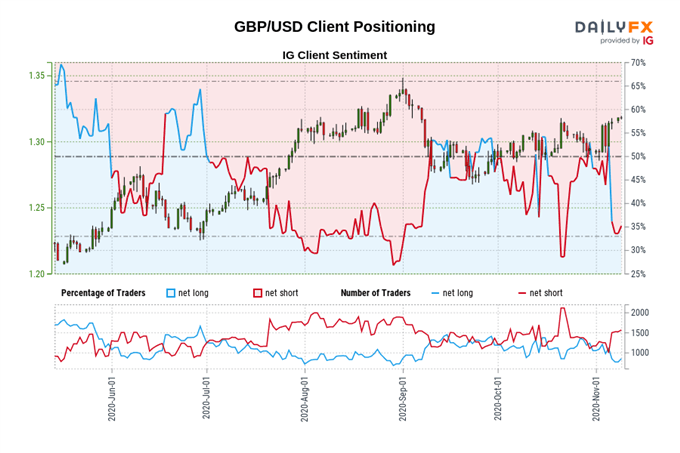
Retail trader data shows 36.52% of traders are net-long with the ratio of traders short to long at 1.74 to 1. The number of traders net-long is 16.34% higher than yesterday and 18.72% lower from last week, while the number of traders net-short is 1.98% higher than yesterday and 18.91% higher from last week.
We typically take a contrarian view to crowd sentiment, and the fact traders are net-short suggests GBP/USD prices may continue to rise.
Positioning is less net-short than yesterday but more net-short from last week. The combination of current sentiment and recent changes gives us a further mixed GBP/USD trading bias.
-- Written by Daniel Moss, Analyst for DailyFX
Follow me on Twitter @DanielGMoss


